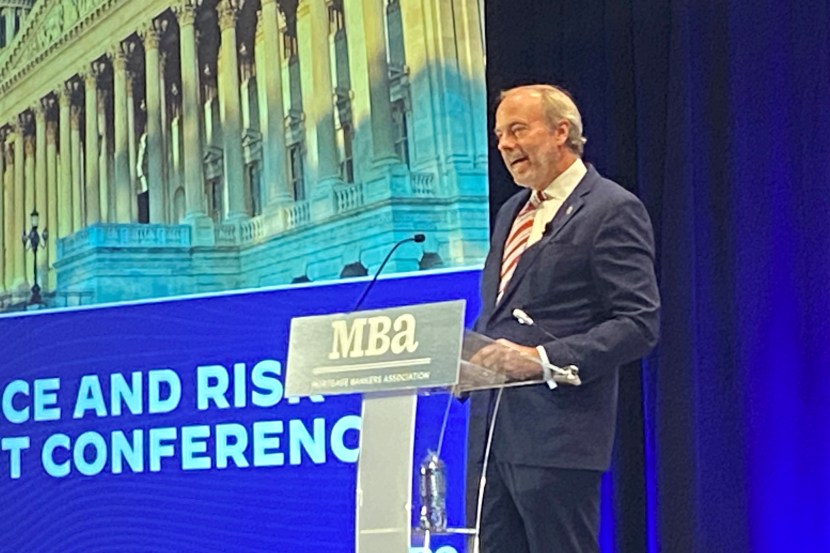
MBA’s Bob Broeksmit Highlights Federal Advocacy Amid Industry Challenges

(MBA President & CEO Bob Broeksmit, CMB speaks at the conference, by Anneliese Mahoney)
WASHINGTON–The mortgage banking industry may be facing some headwinds, but that hasn’t stopped the pace of efforts to advocate for it on Capitol Hill and across federal agencies.
“MBA cannot control macroeconomic forces, but what we can do is make sure the actions of policymakers help our industry instead of hindering it at a crucial time,” Mortgage Bankers Association President & CEO Bob Broeksmit, CMB, said in a session titled “Washington Update” at MBA’s Compliance and Risk Management Conference Sept. 11.
Broeksmit highlighted industry wins in which MBA played a role, including recent U.S. House of Representatives passage of legislation to create federal minimum standards to allow notaries to perform safe and effective remote online notarization transactions.
He also pointed to work to promote support for a measure introduced by Rep. John Rose (R-Tenn.) which would protect consumers by curbing inappropriate use of trigger leads.
When it comes to federal agencies this year, Broeksmit also noted some successes—for example the Federal Housing Finance Agency’s canceled proposal to base some loan level price adjustments on a borrower’s debt-to-income ratio.
But, there are emerging challenges for the industry on the regulatory front, Broeksmit said.
Earlier this year, the Financial Stability Oversight Council at the Treasury Department announced plans to revise the process for designating non-bank financial entities as systemically important financial institutions. It’s also considering lowering standards for designating entire sectors such as mortgage banking and servicing as systemically risky and imposing ever higher capital requirements that could impact access to credit for housing and real estate finance.
MBA opposes that designation, Broeksmit said.
“This will be a major regulatory power grab over a part of the housing finance market that is already well-regulated by the states and other federal agencies,” Broeksmit said. “If FSOC is concerned about the core banking activities taking place outside the purview of prudential bank regulation, then it should reconsider the regulatory environment that has caused the exit of so many traditional depository institutions from the marketplace in the first place. If you regulate everyone out of the business, who is left to originate and service these loans?”
Broeksmit also highlighted the risk from proposed new capital rules on banks as part of the effort to implement Basel III. MBA is working with various allies, including consumer and civil rights advocates, to encourage regulators to rethink those rules.
Another timely issue: The future of the Consumer Financial Protection Bureau. Next month, the Supreme Court will consider cases that challenge the CFPB’s funding and therefore its rulemaking authority.
“While the MBA has its disagreements with many of the Bureau’s regulatory actions, we have a strong position on the need for consistency and our opposition to chaos,” Broeksmit said. MBA has filed an amicus brief to that effect, he noted.
In terms of some of those CFPB disagreements, however, MBA has submitted comments and opposition to the proposed rule requiring non-bank financial firms that are under a final court order or regulatory order to enter those in an online registry.
Additionally, the association submitted comments to the CFPB on its proposed rule creating a registry of certain contract terms and conditions used by non-bank entities.
“In both letters, MBA suggested that rather than creating a complex and difficult-to-comply-with registry, the Bureau’s rulemaking resources should be directed to lowering the costs for borrowers instead of raising costs on mortgage lenders through a proposal to provide little benefit to those consumers,” Broeksmit said.
Another case involves the fair lending space, particularly the applicability of the Equal Credit Opportunity Act to prospective applicants; Broeksmit said MBA has filed an amicus brief in that case, expressing support for the Bureau’s statutory mandate to enforce ECOA.
However, Broeksmit also noted it’s vital that the Bureau adhere to regulatory interpretations that are transparent and consistent with the underlying statute.
The MBA also filed an amicus brief arguing that lenders aren’t responsible for the actions of service providers they don’t control, pertaining to a case before the U.S. District Court for Maryland, in which the Bureau and Justice Department are seeking to extend liability to lenders for bias arising from the use of independent appraisers.
“MBA is working with policymakers and industry stakeholders to develop solutions that ensure borrowers receive fair, equitable and accurate appraisals,” Broeksmit said.
On that note, MBA recently responded to a proposed rule issued by six federal agencies seeking to implement quality control standers for automated valuation models.
“Lenders cannot be held vicariously liable on fair lending grounds for the actions or inputs of an independent third party such as an appraiser or AVM provider. AVMs hold great promise as an opportunity to alleviate appraiser shortages, minimize bias and reduce transaction costs,” Broeksmit said. “Clear rules of the road are necessary so we will stay engaged with federal policymakers on ways to reduce bias and improve accuracy for AVM users of all sizes and business models.”
Finally, MBA recently weighed in on the CFPB’s review of the mortgage loan originator rules, which Broeksmit said provided an opportunity for MBA to request that the Bureau narrow the definition of loan originators.
Technology also plays an important role in MBA’s recent advocacy efforts, Broeksmit said, citing specifically the issues of data security and privacy and the efforts to support consistent national policy.
Ultimately, as the industry continues to respond to these challenges, and others, Broeksmit noted, “the day-to-day work with compliance, quality assurance and fraud prevention is always changing and always complex.”
